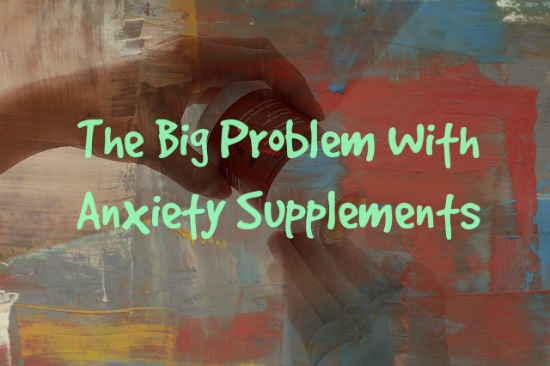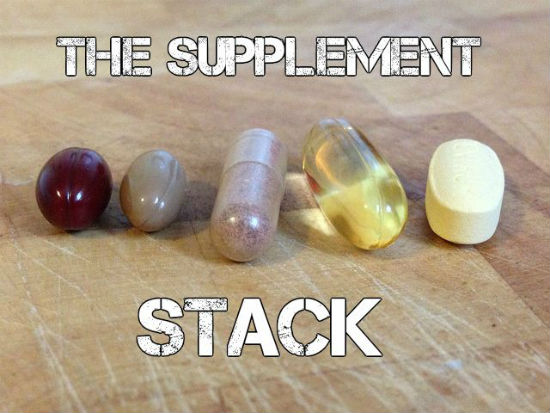Panic runs in my family. I have all sorts of aunts and uncles who have had issues with stress, and to my surprise, I’ve met many other people that have had big issues with OCD disorders throughout their life, even though they would never show it in public.
Anyone who’s had difficulty dealing with anxiety knows the pain that comes from having your entire body paralyzed from debilitating fear that prevents you from living a normal life.
Psychologically most anxiety comes from having to make important decisions and not knowing what to do next. Physiologically anxiety comes from a depressed GABAergic system that can’t stop synaptic firing between your neurons and reduced production of compounds called monoamines that regulate your mood.
It’s useful to think of your mood as a sliding scale. On one extreme you have extreme panic/mania/epilepsy, and at the other extreme you have blissful sleep. It’s not an accident that most stress-reducing herbal extracts are also marketed as sleep inducers, because they depress parts of your nervous system which makes you drowsy and slows down your motor activity. If you’re extremely anxious this will calm you down. If you’re already normal it’ll make you sleepy.
The Big Problem With Anti-Anxiety Supplements
The difficulty with taking any compound for anxiety is that the brain is very selective in what it allows to pass through. Your brain’s blood vessels are 50 times tighter than those flowing to other parts of your body so it won’t be affected by wide fluctuations in plasma content. [footnote]This is called the blood brain barrier, and it actually serves a very useful purpose. Even small variations in concentrations of different molecules could have radical effects on how your brain works, so it has to be choosy. You can read more about the blood brain barrier in this paper: http://www.ncbi.nlm.nih.gov/pmc/articles/PMC1570746/[/footnote]
For example, GABA is a popular supplement to take for improving your mood, but it’s worthless as a supplement because it doesn’t get absorbed by the brain. Nootriment has a very good article explaining why. [footnote]If you want a more academic treatment of this topic look at this article: http://www.phyllisbronsonphd.com/Graphics/BronsonGABA.pdf[/footnote]
Most of the supplements that are effective in reducing anxiety do so by mimicking the effect of GABA once it’s taken up by the brain, or by providing the necessary raw material to allow your body to synthesize the neurotransmitters it needs to regulate the swing between mania and sedation.
The following stack allows you to do both.
Supplement Stack for Reducing Anxiety and Stress
Core Vitamins (take all of these)
5-Methyltetrahydrofolate (5-MTHF) – 400-800 mcg.
Pyridoxal-5-Phosphate (vitamin B6) – 25-50 mg.
Methylcobalamin (Vitamin B12) 400-1000 mcg. [footnote]You could actually take much less than this, but it’s very difficult to find it in stores. It’s hard for manufacturers to reliably make something in smaller doses so they use way more than you need. However B12 is water soluble and easily excreted from the body so there’s no harm of toxicity.[/footnote]
GABA mimicking compounds (take both of these)
Glycine – 500-1000mg;
Taurine – 500mg;
Mood regulating herbal extracts (take one of these, unless you feel no additional effect)
Valerian Root – 400-500 mg;
Ashwagandha as Sensoril – 150-250 mg;
B Vitamins – Why They Work
Most natural treatments for a psychological condition should probably begin with a combination of folate, B12, and vitamin B6. Folate and B12 work together to provide methyl groups [footnote]methyl groups are molecules composed of carbon and hydrogen with the formula CH3. More here: http://en.wikipedia.org/wiki/Methyl_group [/footnote] that get passed along in your brain that eventually allow it to make serotonin (the chemical that makes you happy) and melatonin (the chemical that makes you sleepy). Folate and B12 are the first step in this process, and many of the reactions in the pathway are catalyzed by B6.
Serotonin deficiency is common among people with neurological disorders and most antidepressants work by blocking your nervous system from taking up serotonin so it can stay in circulation.[footnote]Most antidepressants belong to a group of drugs called SSRI’s, which stands for Selective Serotonin Reuptake Inhibitor.[/footnote]
The specific recommendations given here are for the forms of the vitamins that are best absorbed.
Folic acid is not the same thing as folate, which is what your body uses. 1 in 5 people do not have have the enzymes in their liver necessary to convert one to the other. 5-MTHF (also called L-methylfolate) is the methylated form of the vitamin which does not require any additional work by your body to use. Chris Kresser has an excellent article on this topic.
Pyridoxal-5-phosphate is the co-enzymated form of vitamin B6, which is what 95% of your tissues use inside the body. Pyridoxine HCL is the most common form of the vitamin sold commercially.
When you buy B12 your choices are either cyanocobalamin or methylcobalamin. Cyanocobalamin does not occur in nature. Methylcobalamin is the form of the vitamin that interacts with folate in the brain. [footnote]Remember the point before about these two donating methyl groups? To be fair, cyanocobalamin and pyridoxine HCL are still used pretty well by the body, and the differences between these two are not nearly as big as those between folate and folic acid. Read this paper for more details: https://www.nutri-dyn.com/images/LinkedPositionPapers/B6_B12%20Position%20Paper.pdf[/footnote]
These three vitamins work together in a variety of ways and are a good core for many therapeutic purposes.
Taurine and Glycine
GABA would be a great supplement to take if your body could use it…….but it doesn’t. The next best approach is to take natural compounds that give your brain extra thrust to produce it on its own, or increase its sensitivity to the GABA it already has.
Enter Glycine and Taurine.
Glycine is an underappreciated amino acid that used to be prevalent in our diets when we ate parts of the animal beyond its muscle. Things like organs, bones, and hooves might sound gross, but they were common dietary fare for our ancestors and are the best naturally occurring sources of Glycine. Vin Kutty has a very good article explaining how it’s important for your mood.
Both Glycine and Taurine are GABA receptor agonists, which means they improve your brain’s sensitivity to circulating GABA. Glycine functions as a neurotransmitter independent of its link with GABA, and it also regulates B12 and folate in the methylation cycle. Dosing with about 3g of GABA before bedtime improves your sleep, and people with epilepsy and schizophrenia are either deficient in glycine or can’t metabolize it correctly.
Taurine is very similar to an amino acid, and works through channels that are similar but not identical to glycine, making them complimentary to one another. In large doses it promotes sleep and reduces locomotor function, [footnote]a careful reader would note that this paper is done on fruit flies and not humans. Kudos for paying attention. However, the basic sleep/wake mechanisms are actually very similar between fruit flies and humans (and the rest of the biological kingdom) so the basic effect should hold. [/footnote] and taurine’s sedative effect on your nervous system is so strong that some argue that it should be considered a neurotransmitter.
What’s ironic is that taurine is usually put in energy drinks and workout mixes, not anti-anxiety concoctions. That’s because taurine reduces the side effects of caffeine, which allows people to drink more energy drinks without feeling anything funny.
Both of these were recommended at 500-1000mg, but the truth is that you can probably do a lot more without any problems. They’re both naturally occurring amino acids with no reported adverse side effects and dirt cheap to buy.
Valerian Root and Ashwagandha/Sensoril
Valerian Root and ashwagandha are two ayurvedic herbs that’ve been used for a lot of medicinal purposes over the years. Valerian root has traditionally been used to induce sleep, but remember, sleep is little more than the strongest form of sedation.
Ashwagandha is more diverse, with reported uses as varied from sterility, blood pressure, and of course anxiety.
Valerian Root has been shown to mimic the class of pharmaceuticals called benzodiazepines, and in clinical studies has been shown to produce similar results but with less side effects. Valerian provides relief for a lot of problems associated with an overactive nervous system: OCD, restless leg syndrome, insomnia, anxiety, and so on. It’s a complex herb, so it’s important not to take one that’s too highly standardized. Like St. John’s Wort, it probably exerts its effect through a combination of chemicals and not just one.
Ashwagandha is a common ingredient used in anti-anxiety supplements, and the most common form of the ingredient is the patented Sensoril, which was developed by Natreon. I don’t normally recommend trademarked ingredients because the generic form usually suffices, but Sensoril is the only extract that has a variety of clinical studies associated with it specifically for reducing anxiety, and has been shown to be effective at doses as small as 150 mg for this purpose.
I’ve also met the CEO/founder of the company, and can attest to his authenticity.
Unlike other substances in this article, you should be careful with doses here, and it’s probably best to start with one. Either of these can enhance the effect of any sleep/anxiety medication you’re currently taking, and with Valerian people can start to experience side effects at around 1000 mg.
Reference Table
Any article like this inevitably prompts the question: “Where the heck do I buy this?” Here’s a condensed guide for everything discussed here.
[table id=22 /]


Can you use valerian root if you’re already taking Lunesta?
LikeLike
Sally,
Valerian Root works in similar ways as lots of popular sleeping medication, and will most likely increase its effect.
LikeLike
At what point of the day should you take this stack? Should it be spilt up or taken all together?i.e. Take b vitamins in a.m., gaba and valerian before bed
LikeLike
Hi Bryan,
Valerian is definitely best before bed. The B vitamins should not matter all that much. I’ve updated my priors since writing this article and would not bother with GABA.
LikeLike
Jonathan,
Thanks for the reply. I am going to go with the b vitamins and the ashwagandha extract. Plan to take the b vitamins in the morning and one ashwagandha pill in the a.m. and one in the afternoon. If you have any other recommendations please let me know.
LikeLike
Can I take ashwaganda if taking levothyroxine..? Thanks
LikeLike
[…] Ashwagandha Extract (125mg) […]
LikeLike
My neurologist said he belives GABA does work and it does cross the blood brain barrier. the statement you made above: ((For example, GABA is a popular supplement to take for improving your mood, but it’s worthless as a supplement because….)) does not have proof either way. it all depends who you talk to. it is cheap and worth a person the try it, it works for me.
LikeLike
When it comes to Ayurvedic herbs like ashwagandha and Valerian forget about buying OTC capsules. Totally useless. You need the pure ground powder and you need to be taking 3 to 4 grams (not mg lol) 3x per day. Also certain ayurvedic herbs should be taken in a specific way (another of a myriad of reasons why OTC capsules are a joke). Ashwagandha must be taken either in warm to hot milk or with ghee and allowed to sit in the warm milk (say a 3rd of a cup) for at least 10 minutes. Simply taking it with water does very little. A teaspoon of honey in the milk is essential. You will find out why if you don’t. Finally the B vitamins and zinc are important but don’t forget NAC and Alcar (acetyl L Carnitine). Very very good for mood disorders.
LikeLike
So gaba is no good but then further down you say take before bed!
LikeLike